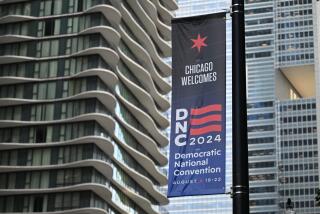GOP Will Keep Its Majorities, Bush Predicts
CHICAGO — Vowing that the Republican Party would fend off Democratic gains in the November congressional elections, President Bush on Friday demonstrated part of his new strategy for victory: Stay close to the usual script -- but do it in an unusual place.
Bush took the uncommon step of holding a formal news conference away from the White House, and he cast aside his typical practice of one-day trips in favor of spending a night and a day in the city. In Chicago, he cracked, the locals might not be so bored of his old stories.
In addition to headlining a fund-raiser for the Republican candidate for governor -- a traditional role for the president -- Bush toured a museum, went out for a fancy dinner with the mayor, and lingered at a crowded breakfast joint for an hour. They were unusual moves for a man who is not known for a love of tourism and prefers sleeping in his own bed after a quiet dinner at home.
“I like to see what it’s like to have a major press conference outside of Washington,” he said, standing in the cavernous rotunda of the Museum of Science and Industry, with old airplane models hovering overhead.
“It might do me some good,” he added.
His hourlong exchange with local reporters and the traveling White House press corps contained little news, and was notable mainly for the setting and for Bush’s insistence that he intended to be a factor in this year’s elections -- low approval ratings or not.
Asked about a published remark by an aide to Judy Baar Topinka, the GOP gubernatorial candidate, that the campaign would be better off if the president came in the middle of the night, Bush shot back: “I’m coming to lunch.”
What’s more, he proclaimed that the $1.2-million fundraiser would be a success. And he brought into sharper focus what is likely to become the White House’s campaign message for future road trips: Republicans will keep Americans safe, keep taxes low, and offer more ideas than the Democrats.
“You win elections by believing something,” Bush said. “You win elections by having a plan to protect the American people from terrorist attack. You win elections by having a philosophy that has actually produced results -- economic growth, for example -- or kind of changing the school systems for the better, or providing prescription drug coverage for elders.”
Despite polls that indicate Democrats are positioned to make gains in November, Bush said Republicans would retain control of the House and Senate. “I’m looking forward to these elections,” he said. “I think you’ll be surprised.”
Answering a question about his authority to try detainees before military tribunals, Bush reiterated his belief that the Geneva Convention does not apply to detainees being held at Guantanamo Bay, Cuba.
“The Geneva Conventions were set up to deal with armies of nation-states,” he said. “You’ve got standard rules of war. So, this is new ground. This is different than any president has been through before, in terms of how to deal with these kind of people that you’re picking up off a battlefield and trying to protect the American people from.”
His comments appeared to contradict last week’s 5-3 ruling by the Supreme Court, written by Justice John Paul Stevens, that said a provision of the Geneva Convention governing combatants not tied to nation-states applies to the fight against Al Qaeda.
Bush said Friday that he was “willing to abide by the ruling.” But coming as administration officials continue to examine the ruling, Bush’s comments were another indication that the White House was moving toward a very narrow interpretation of the court decision.
Legal experts and detainees’ advocates have insisted the ruling means the Geneva Convention covers all detainees at Guantanamo and, possibly, Al Qaeda leaders being held in undisclosed locations.
Reinforcing the message that Bush was far outside the Beltway, he stood before a giant picture of the city skyline displaying, in giant letters, “CHICAGO.”
The overwhelmingly Democratic city in a blue state seemed a peculiar choice as a kickoff for the new White House communications strategy, particularly in light of headlines that greeted the president and his entourage Friday morning.
On Thursday, a former top aide to Mayor Richard M. Daley and three other city officials were convicted of directing city jobs to campaign workers. The convictions were the work of a prosecutor familiar to Bush, U.S. Atty. Patrick J. Fitzgerald, who as a special prosecutor has been leading the investigation into who leaked the name of former CIA officer Valerie Plame to the media. That investigation has led to the indictment of Vice President Dick Cheney’s former chief of staff.
Though Daley is a Democrat whose family name symbolizes that party’s dominance in Chicago politics, the mayor and Bush have built a friendship. The two dined together Thursday night at the famed Chicago Firehouse Restaurant.
Asked how he viewed Daley in light of the convictions, Bush said: “I still think he’s a great mayor.”
As for Fitzgerald, who last month informed White House strategist Karl Rove that he would not be charged in the CIA leak investigation, Bush lauded the prosecutor for his professionalism and his ability to stay out of the news. “You didn’t see a lot of people kind of dropping a little crumb here for the press to chew on,” Bush said.
Times staff writers Peter Spiegel in Washington and P.J. Huffstutter in Chicago contributed to this report.
More to Read
Sign up for Essential California
The most important California stories and recommendations in your inbox every morning.
You may occasionally receive promotional content from the Los Angeles Times.










